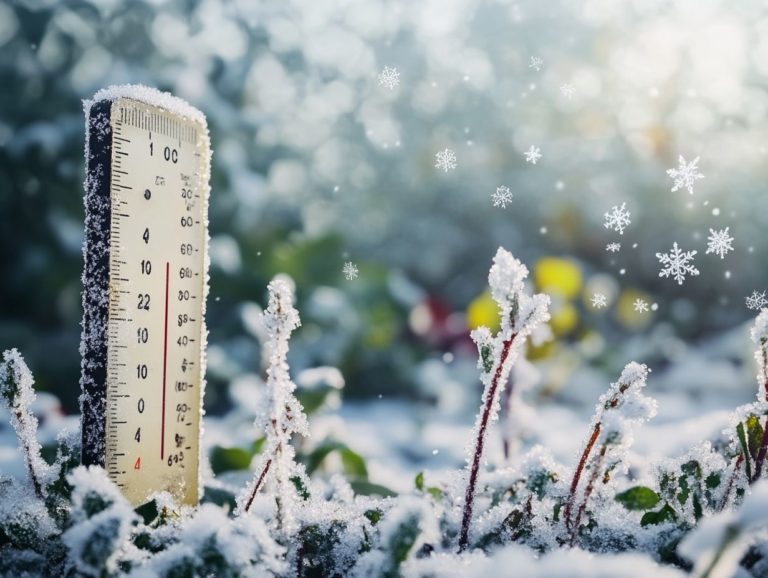5 Ice-Breaking Tips for Winter Pest Management
As winter descends and temperatures take a nosedive, your home transforms into a cozy sanctuary not just for you, but also for unwelcome pests. Get ready to protect your haven against pesky winter intruders!
From mice to spiders, these little intruders often venture indoors in search of warmth and shelter, bringing along potential health risks and the threat of property damage. Here are five essential tips to fortify your home against winter invaders. Delve into the world of common winter pests, discover their entry points, and know when it s time to summon the professionals.
Prepare to winter-proof your home!
Contents
- Key Takeaways:
- 1. Seal All Entry Points
- 2. Keep Your Home Clean and Clutter-Free
- 3. Use Natural Pest Repellents
- 4. Remove Any Standing Water
- 5. Get Professional Help
- What Are the Most Common Winter Pests?
- What Are the Dangers of Winter Pests?
- How Can One Prevent Winter Pests from Entering Their Home?
- Are DIY Pest Control Methods Effective in the Winter?
- When Is It Necessary to Call a Professional Pest Control Service?
- Frequently Asked Questions
- What are some effective ice-breaking tips for winter pest management?
- Why is it important to address winter pest management?
- What are some common winter pests to look out for?
- How can I deter pests from entering my home during the winter?
- Are there any DIY methods for managing winter pests?
- What are the benefits of hiring a professional for winter pest management?
Key Takeaways:

- Seal your home tightly to prevent winter pests from entering.
- Keep it tidy to eliminate hiding spots for pests.
- Go natural with pest solutions to avoid using harsh chemicals in your home.
1. Seal All Entry Points
To effectively keep winter pests like mice, cockroaches, and spiders at bay, take charge and seal all potential entry points. This proactive approach not only fortifies your home against infestations but also creates a protective barrier around your property.
Common entry points include small cracks in walls, gaps around windows, and spaces around doors. You can utilize materials like caulk or expanding foam to secure these weak spots, while weather stripping provides an effective solution for your windows and doors.
Regular inspections help maintain a pest-free environment. They assist you in identifying new entry points that may emerge over time. By staying vigilant and promptly addressing these issues, you can greatly enhance your defenses against a variety of pests.
2. Keep Your Home Clean and Clutter-Free
Maintaining a clean and clutter-free home is a game-changing step to keep pests away, as it disrupts the pest life cycle during the winter months and reduces hiding spots for unwanted visitors.
Your regular cleaning routines, including consistent vacuuming and dusting, play a crucial role in ensuring that crumbs and debris don t become an open invitation for pests. Proper food storage is essential; using airtight containers makes it difficult for pests to access food sources.
Implementing decluttering strategies helps transform your space into an organized haven that s less appealing to critters. When your environment is well-kept, you boost the effectiveness of pest prevention measures, creating a home that s decidedly less hospitable for pests.
3. Use Natural Pest Repellents
Natural pest repellents work wonders, offering a safe alternative to chemical treatments while still maintaining control over pests in your home.
During festive seasons, when decorations like Christmas lights tend to attract unwanted pests, these options are even more important. Essential oils, such as peppermint and eucalyptus, create a fragrant barrier that repels insects while infusing the air with a delightful aroma. Diatomaceous earth acts as a powdery deterrent, effectively disrupting the outer shells of pests and ensuring they steer clear of your holiday setup.
Vinegar solutions can also be sprayed in areas prone to infestations. Not only do they serve as a repellent, but they also provide a non-toxic cleaning alternative for your beautifully adorned spaces. By integrating these methods, you can enjoy a pest-free environment even during the busiest times of the year.
In conclusion, take these steps now to protect your home from winter pests. By sealing entry points, keeping your space clean, and using natural repellents, you can create a welcoming environment for yourself while following these 5 steps to a pest-free winter garden to keep the unwelcome intruders at bay!
4. Remove Any Standing Water

Removing any standing water around your property is crucial for effective pest control. Stagnant water can quickly become a breeding ground for pests, exposing you to diseases like Hantavirus and Leptospirosis, both serious health risks.
Common culprits of standing water often include clogged gutters, where rainwater accumulates and sits, as well as bird baths that aren t cleaned frequently. Puddles from overwatering your garden or neglected outdoor containers can also attract unwanted insects.
To tackle these issues, it s important for you to regularly clear out your gutters and manage winter services, refresh bird baths with clean water at least once a week, and eliminate any unnecessary standing water in containers.
By actively managing these potential problem areas, you can significantly reduce the attraction of pests and create a healthier environment. This minimizes the risk of illness and makes your outdoor spaces safer for your family and pets. Start inspecting your property today to keep pests away!
5. Get Professional Help
When you re facing persistent pest issues, seeking professional help, such as services from Aptive or American Pest through pest control services or preventive service providers can be your best bet. Look for companies that offer commercial contracts for effective pest control and exceptional customer service to enhance business efficiency tailored to your specific needs.
These specialists utilize advanced pest control software like GorillaDesk, enabling them to manage infestations efficiently. Their approach is not only effective but also customized for your unique environment.
Given that the industry is continually evolving, ongoing education for pest control technicians is vital. By staying up-to-date on the latest treatments and technologies, they can implement the most effective strategies to tackle pest problems while minimizing environmental impact.
This combination of cutting-edge tools and expert knowledge not only addresses your immediate concerns but also helps prevent future issues. It s a comprehensive solution that you can count on, whether you re a homeowner or a business owner.
What Are the Most Common Winter Pests?
Are you ready to take control of your home this winter? Understanding the most common winter pests is key for effective pest control. To keep these unwelcome guests, like mice, spiders, silverfish, and cluster flies, at bay, consider implementing 5 tricks to keep pests away in winter, as they often seek refuge indoors when temperatures drop.
This behavior disrupts your household and can result in significant property damage and health risks. Mice, for example, chew through wires and insulation, creating fire hazards and jeopardizing your electrical systems. Meanwhile, spiders tend to leave behind webs that can look unsightly and gather dust. Silverfish thrive in damp, dark areas, potentially damaging your fabrics and paper products, while cluster flies can invade your home in alarming numbers, causing frustration and stress.
By recognizing these winter intruders and understanding their habits, you can implement 5 quick tips for managing winter pests, ensuring a safer and more comfortable home throughout the chilly season.
How Do Pests Enter Homes During the Winter?
Pests can find their way into your home during winter through various entry points, such as unsealed doors, cracks in the foundation, and gaps around windows. Implementing essential traps for cold-weather pests makes effective pest prevention absolutely vital to keeping them at bay.
It’s important to recognize that these pests are often in search of warmth and shelter as temperatures drop, taking advantage of even the smallest openings to gain entry. To effectively combat this issue, ensure you have the right tools by exploring essential cold-weather pest management tools. Be diligent in inspecting your property for potential vulnerabilities.
For instance, checking for worn-out weather stripping around doors and windows is essential, along with examining the exterior for any gaps near plumbing or electrical lines.
Implementing wildlife exclusion techniques, such as sealing these openings with caulk or wire mesh, not only strengthens your home but also discourages critters from moving in. Regular maintenance checks can significantly impact your efforts to prevent infestations.
What Are the Dangers of Winter Pests?

Winter pests can pose significant dangers, including the spread of diseases like Hantavirus and Leptospirosis. This highlights the need for effective pest management strategies and preventative measures.
As temperatures drop, it’s common for rodents and insects to invade your home, bringing alarming health risks. The Centers for Disease Control and Prevention (CDC) indicates that Hantavirus can be fatal in approximately 38% of cases. Leptospirosis may lead to kidney damage, liver failure, and respiratory distress. Studies show that over 20,000 cases of Leptospirosis occur annually in the U.S., reminding us of the pervasive threat these pests represent.
It’s essential for homeowners to recognize the signs of infestations early and implement timely pest control interventions. Following the best practices for pest monitoring in winter can help ensure a safe and healthy living environment throughout the winter months.
How Can One Prevent Winter Pests from Entering Their Home?
Preventing winter pests from entering your home requires a detailed plan that combines pest prevention techniques with effective control measures and wildlife exclusion tactics.
Start by sealing potential entry points gaps around windows, doors, and foundation cracks to ensure that pests have no easy access. Maintaining a clean environment is crucial; decluttering and regularly disposing of trash helps eliminate attractants and nesting spots.
Consider integrating professional services into your prevention efforts. Experts can uncover hidden vulnerabilities in your property and apply specialized treatments tailored to your needs. By following 5 steps for successful winter pest control, you can establish a strong barrier against pests, protecting your home from unwanted intruders during the colder months.
Are DIY Pest Control Methods Effective in the Winter?
While DIY pest control methods can sometimes work, they often struggle during winter when pests become miniature survival experts. During this time, utilizing the top cold-climate pest management strategies becomes essential.
As the temperature drops, many household pests move indoors, seeking warmth and food. This can make it quite challenging for those trying to manage infestations alone. You might have some luck with traps or natural repellents, but those solutions can fall short against larger problems, especially if pests have already made themselves comfortable in your walls or insulation.
It’s crucial to assess the type of pest and the scale of the infestation. When faced with widespread invaders or pests that present health risks like rodents or termites it s often wiser to call in the professionals. They can offer targeted treatments and comprehensive prevention strategies, ensuring that your home remains a haven, not a pest hotel.
When Is It Necessary to Call a Professional Pest Control Service?
Knowing when to contact a professional pest control service is vital for effective pest management, particularly with large infestations or specialized pest issues that require expert attention.
For instance, persistent rodent or termite problems disrupt your living space and pose significant risks to your health and property. Homeowners might be tempted to handle these issues with DIY methods, but without the proper tools and expertise, these attempts can lead to further complications.
By engaging expert pest control teams, you ensure that the problem is addressed efficiently, significantly reducing the chances of recurrence. Establishing a commercial contract gives you peace of mind, as it includes regular inspections and preventive treatments, making it a wise investment for long-term pest management.
Frequently Asked Questions

Act now to protect your home from winter pests! Contact a professional today!
What are some effective ice-breaking tips for winter pest management?
1. Seal any cracks or openings in your home’s foundation or walls. This prevents pests from sneaking in.
2. Keep your outdoor garbage and compost bins tightly covered. This avoids attracting unwanted guests.
3. Trim back tree branches or shrubs touching your home. They can act as bridges for pests.
4. Store firewood at least 20 feet away from your house. This keeps pests from using it as a nesting spot.
5. Use weather stripping on doors and windows. This is another effective barrier against pests.
Why is it important to address winter pest management?
Winter pests can wreak havoc on your home and health. Protect your living environment by taking preventative measures.
What are some common winter pests to look out for?
Common winter pests include rodents, spiders, cockroaches, and ants. These pests seek warmth and shelter during colder months.
How can I deter pests from entering my home during the winter?
Seal openings and trim trees and shrubs. You can also use natural deterrents like peppermint oil or vinegar.
Keeping your home clean and decluttered helps, too! A tidy space is less attractive to pests.
Are there any DIY methods for managing winter pests?
Yes, you can set up mousetraps or use natural repellents like boric acid. For severe infestations, consider calling a professional pest control service.
What are the benefits of hiring a professional for winter pest management?
Professionals have the expertise and tools to eliminate pests effectively. They provide long-term solutions, saving you time and stress.
They also use eco-friendly methods, ensuring the safety of your family and pets!






